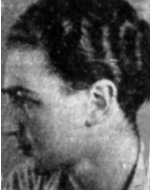Perlman, Nathan
Born in Warsaw, Poland, on December 3, 1924, son of Ora was born in Poland and studied at the Yehudiya School and the Laor High School and grew up in a home full of Jewish-national culture. , The sorrow and joys of the Jews of Poland, and in 1938 immigrated to Israel with his parents and was accepted to the “New High School” in Tel Aviv, skipping one class, quickly adopting the Hebrew language as if he had never known a different language. He was very talented in his studies, quiet, preoccupied, but the things he uttered when necessary were the fruit of thought and judgment, at the age of 17, after completing his studies in Gymnasium He went to Kibbutz Yagur as a member of the hachshara, worked in the vegetable garden, was a wagon driver, and at night he was a camp guard, and at the end of 1942 he was accepted to the university in Jerusalem and was a full-time student in the Department of Humanities. “He enlisted in the Jewish Settlements Police and served in Kiryat Anavim, Ma’ale Hachamisha, Neve Yaakov, Atarot and Hartuv. Among the students was a member of the Labor Party. To facilitate his parents, he worked as a private teacher and acquired a reputation as a teacher. Was a social man full of joy, optimistic, gentle in his ways. Many friends gathered around him. He fulfilled the doctrine of self-actualization to the end, faithful and true-loving. In 1944, he received an English-Hebrew interpreter from the British Mandate Intelligence Office. He devoted himself to his favorite journalistic work and worked for the Hebrew news system and the press in the Jerusalem Voice. He also considered himself a national soldier in the broadcasting service. Did his job there for a first-class Zionist service. In the days of the siege of Jerusalem at the beginning of the War of Independence, the Haganah headquarters assigned him the position of military correspondent in the Hebrew underground Voice of the Magen, and was the first military correspondent to take an active part in the battle. He went with a platoon from the Moriah battalion to ambush Arab transport on the Jerusalem-Ramallah road. On the way back to Atarot they were attacked by an Arab mob, surrounded and fought a fierce battle with the enemy. This battle fell on the 23rd of Adar I 5708 (March 4, 1948). He was buried in Sanhedria in Jerusalem. In memory of Natan, the first military correspondent of the Hebrew Voice of the Magen, a prize was awarded to the Reporter, and to his memory and to the memory of his friends with whom he fell, he was named to one of the streets in Tel Aviv. On the 5th of Elul 5711 (6.9.1951), he was put to rest at the military cemetery on Mount Herzl in Jerusalem.
